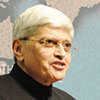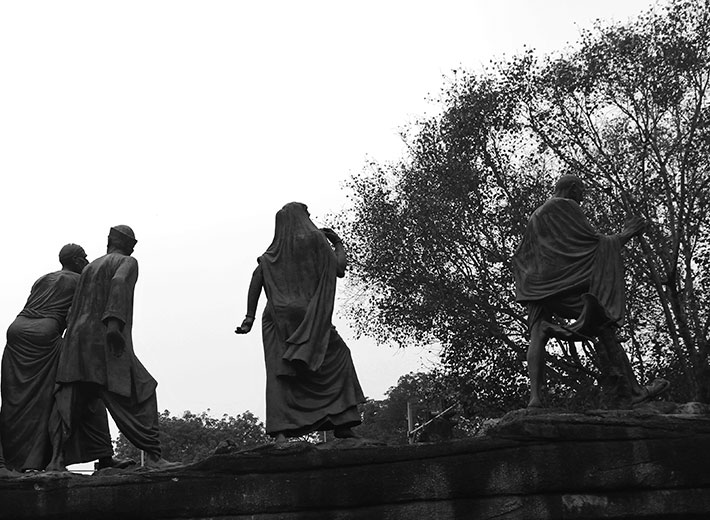As governments in a Republic, our ruling class has to cease looking upon itself as a Huzuriyat
There are two uses of the word ‘change’. The first is lofty, big and all of us know it. Let me start with the one that is not so famous, the lesser ‘change’ – the small change, the smaller denomination currency notes, loose coins.
In its sense and use of smaller bank notes, ‘change’ generally means the fifty, twenty, ten and five rupee notes that one can give or get when ‘breaking’ a hundred rupee note. In its use for coins, ‘change’ would mean the one, two, five rupee coins that we know, the sound of the word ‘change’ recalling the ring of metal shaken in a closed fist.
I do not know if you, the reader of this piece, have noticed it but, of late , small change, the ‘khulla’ in Hindustani, the ‘chhuta’ in Gujarati, or what in Tamil is called ‘sillarai’ (from which comes the Indo-Anglian ‘chiller’) has become a rarity. The fifty, twenty, ten and five rupee are around but not as plentifully as before.
The hundred rupee bluey is now legal tender. Whether one wants to buy sabzi, a kilo of rice or atta, a tube of toothpaste or a biro pen, the hundred rupee note pops out routinely and is accepted matter-of-factly which is when trouble begins. ‘Khulla nahin hai ji’… And so one buys something else, not so needed, and then the change, in a reduced value, comes along with a toffee or two to make up for the dregs of change due.
The hundred rupee note rules, reigns, like it has never before, yielding privileged space only to the five hundred and thousand rupee note. The fifty rupee brownie comes when it does, soiled, moiled, roiled, almost sticky, by over-use. It looks like a used-up strip of band-aid. As for the tawny ‘tenner’ and the greenie ‘fiver’, they are now in retreat. And as the Reserve Bank of India, bless it, goes about a ‘fresh issues’ in polymer, they will, mark my words, become collectors’ items.
As for coins, they have become utterly pitiful. They are not made of copper but in terms of status, now, they are ‘coppers’ as they have not been before. I have never been comfortable dropping coins into outstretched palms or tins, even less so, bypassing them. There are too many issues involved: does alms-giving encouraging hideous exploitation by unseen ‘beggar’-dons, sloth? Or, in not sparing that wretched copper, am I being lazy myself apart from being un-caring? Be that as it may, there is a clear expectation among alms-receivers, now, of paper money. If the scarcity of twenties, tens and fives had upped street-philanthropy to the fifty or hundred rupee note, there would have been something to be glad of. But no, the progressive regression in the value of the coin and the availability of small paper money has had its adverse impact on alms.
I know nothing of finance, monetary finance, the rarefied world of currencies, and such esoteric subjects. But this much I can say: The use of a likeness of the Mahatma on bank notes at a time when ‘khulla’ are scarce, gives a new meaning to the saying attributed to him – “Be the change you want to see”.
Those exact words are not Gandhi’s, the idea behind it certainly is.
Another catchy phrase attributed to him ‘There is enough for everyone’s need, but not for anyone’s greed’, is also not his, the idea behind it being one he would have gladly endorsed.
I believe in those two logical mis-attributions lies the key to some important steps that need to be taken by
1. us as a people
2. by the governments that rule over India, and
3. by the corporates that hold us in their thrall.
As a people, we want administrations to be more responsive, more attentive, more accountable than they are. And so they should be. In few countries does insensitive Babudom go as un-questioned as in India, inattentive Afsardom as un-tackled as in India and incommunicative Mantridom as un-admonished as in India. But do we, as a people, have the moral right to administer those correctives? Extraordinarily caring and public-spirited instincts come to the fore amongst us in moments of need, true. All of us have seen how people in a bus, on a railway station, at sites of terrorist attacks, simple people rise to the occasion in super-human courage to give succour to the distressed or the traumatized. But during ‘normal’ times, we are horribly callous to fellow-humans, to society and, of course, to the physical environment. I will not even begin to describe the wanton violence and cruelty that Indians, ‘private’ individuals, are capable of, towards the weak and the vulnerable.
This has to change. Easily said! And so, how? By those amongst us who are constantly harping on the need for administrations, for governments, for politicians to change, also and in the same breath, challenge us, the people of India, to also look within.
As Governments in a Republic, our ruling class has to cease looking upon itself as a Huzuriyat. This does not mean that high dignitaries must start travelling in buses and autos though there would be nothing wrong in their doing so from time to time. This does not mean that they should shift from earmarked residences and offices to work from ‘downtown’, though a touch with that suburb of life will do them no harm. And this does not mean that they should not exercise authority with the firmness that becomes authority, though shedding hubris will only befit them.
This only means that they must see what should be obvious that in a Jumhuriyat, Huzuriyat has no place, only Insaniyat has.
How are they to start? By spending one day in a week as private citizens, joining fellow-citizens in their daily travails. Simplistic? Not at all. Most realistic. Ask any government pensioner and he will tell you that it is only after he became a pensioner that he realised what the common man has to go through.
As trustees of the nation’s natural resources and investible capital and technologies, our corporates splurge on the facilities at their command. See how they use electricity, water and land. There are wastages to be trimmed, huge un-accounted wastages. When I was Governor of West Bengal, a cripplingly power-deficit state, I wrote to a great number of ‘bulk users’ of electricity to cut down on their consumption voluntarily. Not even 5% of those I wrote to even bothered to reply, let alone comply. I was not questioning their production lines, their manufacturing tracks, their product grooves, only asking them as users of a precious commodity to use them optimally.
Will they ever hearken to advice? They better, while there is time.
Things have to change, but change has to come by personal example leading the way.
If coins are copper, notes are paper.
Money, therefore, is what it comes as.
It is the gold of real value behind those that gilds money’s surface, unseen.

